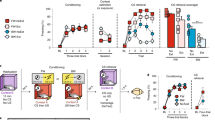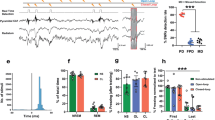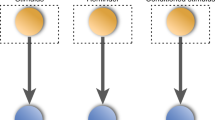Abstract
Retrieval of fear conditioning turns memory into a labile state sensitive to disruption. Here, I raise the issue that in addition to aversive, amygdala-dependent memories, other forms of memory are susceptible to the same effect, and I review evidence indicating that neuromodulation may have a significant influence on the reconsolidation process.
This is a preview of subscription content, access via your institution
Access options
Subscribe to this journal
Receive 12 print issues and online access
$189.00 per year
only $15.75 per issue
Buy this article
- Purchase on Springer Link
- Instant access to full article PDF
Prices may be subject to local taxes which are calculated during checkout

Similar content being viewed by others
References
McGaugh, J. L. Memory — a century of consolidation. Science 287, 248–251 (2000).
Miller, R. R & Matzel, L. D. Memory involves far more than 'consolidation'. Nature Rev. Neurosci. 1, 214–216 (2000).[ Abstract]
Nader, K., Schafe, G. E. & LeDoux, J. E. Fear memories require protein synthesis in the amygdala for reconsolidation after retrieval. Nature 406, 722–726 (2000).
Sara, S. J. Retrieval and reconsolidation: toward a neurobiology of remembering. Learn. Mem. 7, 73–84 ( 2000).
Lewis, D., Bregman, N. J. & Mahan, J. Cue-dependent amnesia in rats. J. Comp. Physiol. Psychol. 81, 243–247 ( 1972).
Lewis, D. J. & Bregman, N. J. Source of cues for cue-dependent amnesia in rats. J. Comp. Physiol. Psychol. 85, 421–426 (1973).
Bregman, N. Nicholas, T. & Lewis, D. Cue-dependent amnesia: Permanence and memory return . Physiol. Behav. 17, 267– 270 (1976).
Squire, L. R. Memory and the hippocampus: a synthesis from findings with rats, monkeys, and humans Psychol. Rev. 99, 195– 231 (1992).
Przybyslawski, J. & Sara, S. J. Reconsolidation of memory after its reactivation. Behav. Brain Res. 84, 241–246 (1997).
Sara, S. J., Roullet, P. & Przybyslawski, J. Consolidation of memory for odor-reward association: β-adrenergic receptor involvement in the late phase. Learn. Mem. 6, 88–95 (1999).
Przybyslawski, J., Roullet, P. & Sara, S. J. Attenuation of emotional and nonemotional memories after their reactivation: role of β-adrenergic receptors. J. Neurosci. 19, 6623–6628 ( 1999).
Roullet, P. & Sara, S. J. Consolidation of memory after its reactivation: involvement of β-noradrenergic receptors in the late phase . Neural Plast. 6, 63–68 (1998).
Mayford, M., Abel, T. & Kandel, E. R. Transgenic approaches to cognition. Curr. Opin. Neurobiol. 5, 141–148 (1995).
Devietti, T. L., Conger, G. L. & Kirkpatrick, B. R. Comparison of the enhancement gradients of retention obtained with stimulation of the mesencephalic reticular formation after training or memory reactivation. Physiol. Behav. 19, 549–554 (1977).
Sara, S. J., Deweer, B. & Hars, B. Reticular stimulation facilitates retrieval of a 'forgotten' maze habit. Neurosci. Lett. 18, 211– 217 (1980).
Dekeyne, A., Deweer, B. & Sara, S. J. Background stimuli as a reminder after spontaneous forgetting: Potentiation by stimulation of the mesencephalic reticular formation. Psychobiology 15, 161–166 (1987).
Devauges, V. & Sara, S. J. Memory retrieval enhancement by locus coeruleus stimulation: evidence for mediation by β-receptors. Behav. Brain Res. 43, 93–97 (1991).
James, W. The Principles of Psychology (Henry Holt, New York, 1890).
Spear, N. E. & Mueller, C. W. in Memory Consolidation: Psychobiology of Cognition 111–147 (Lawrence Erlbaum Associates, Hillsdale, New Jersey, 1984).
Tulving, E. & Thomson, D. Encoding specificity and retrieval processes in episodic memory. Psychol. Rev. 80, 352–372 (1973).
Author information
Authors and Affiliations
Rights and permissions
About this article
Cite this article
Sara, S. Strengthening the shaky trace through retrieval. Nat Rev Neurosci 1, 212–213 (2000). https://doi.org/10.1038/35044575
Issue Date:
DOI: https://doi.org/10.1038/35044575
This article is cited by
-
Brexpiprazole blocks post-traumatic stress disorder-like memory while promoting normal fear memory
Molecular Psychiatry (2021)
-
d-Aspartate consumption selectively promotes intermediate-term spatial memory and the expression of hippocampal NMDA receptor subunits
Scientific Reports (2021)
-
The selective TAAR1 partial agonist RO5263397 promoted novelty recognition memory in mice
Psychopharmacology (2021)
-
Preventing and treating PTSD-like memory by trauma contextualization
Nature Communications (2020)
-
Increase in serotonin precursor levels reinstates the context memory during reconsolidation
Invertebrate Neuroscience (2019)



